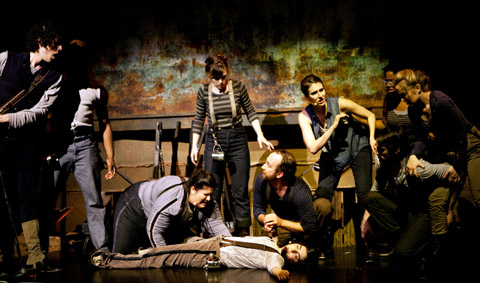
CONVOLUTION Good music doesn't necessarily make for good musical theater. |
It isn't easy to put together a 90-minute musical that includes the Civil War, the birth of computer programming, indie rock, the internal dynamics of Lord Byron's family, mathematical formulas, and writing letters back and forth about an invention that will either save the world or be a precursor to the atom bomb.So give credit to the American Repertory Theater and artistic director Diane Paulus for greenlighting such an ambitious project. Unfortunately, when you add all those ingredients into the world premiere of Futurity: A Musical by the Lisps at ART's Oberon space (through April 15), you have quite a bit less than the sum of all those parts.
Not that there aren't things to like about the show, starting with the indie folk-rock group the Lisps, who wrote the music with lyricist and band cofounder César Alvarez. He, in turn, wrote the book with playwright Molly Rice. There's a bouncy, infectious nature to the music that might remind you of the Avett Brothers or Mumford and Sons. (I realize, after encountering some eye-rollers when I tell people that I like those groups, that such a comparison might scare some folks off rather than draw them in.) The Lisps and the ART Institute thespians, along with a handful of professionals, also form a smart, cohesive acting company.
Oberon has seats on the floor for this one, which is just as well. There's been a certain sameness to the vibe at The Donkey Show and other dance-alongs at Oberon, so the less hyper feel and cleaner sound mix (thanks to Alvarez and Matt Tierney) of Futurity feels like a fresher way to go, even if it's more staid. Director Sarah Benson and choreographer Annie-B Parson also know how to use the space creatively, which can't be said of all their predecessors except for Paulus and her choreographers.
But writing for the theater isn't the same as for the rock stage — just ask Paul Simon. Theatrical songwriting — even for "rock musicals" like Hair or Rent — involves the seemingly contradictory arts of moving the story along while simultaneously lingering over emotional high points, and Alvarez and the Lisps don't turn either of those tricks. (Compare David Byrne and Fatboy Slim's Here Lies Love, which admittedly was not a fully staged portrait of Imelda Marcos.)
Compounding the problem are Alvarez's lyrics, which are awkward and ill-fitting: "I wonder how the nervous system powers the sensations/that are mediated through the miniscule vibrations/of the molecules and fluids that comprise the human form." Eat your heart out, Stephen Sondheim.
All right, Alvarez isn't working the same terrain as Sondheim, but even here Alvarez and Rice could take some lessons in deconvolution. Alvarez plays Julian Munro, a Union soldier who hooks up with Byron's daughter, Ada Lovelace, who worked with Charles Babbage on the first computer prototypes. Munro wants her to invent a machine that will end not only war but all human suffering. One wonders, though, if this machine might not be the prototype of something akin to the atom bomb. Since Futurity continually hammers home the need to strive for peace, why undermine its own message?
Perhaps there's a level of irony that I'm not giving full credit — well, any credit— here. If that's what the Lisps and Rice are after, they need to cut down on the moralism and up the ante on the sardonic. Again, see Here Lies Love. And if this is an antiwar message play, they need to find a better way to give peace a chance.